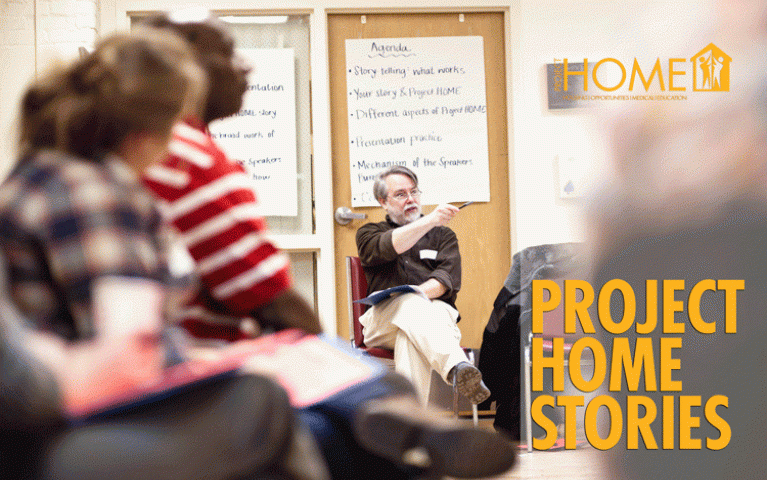The Armament of the Soul

Nicole Tell works in Project HOME’s Development Department, where she serves as Director of Donor Relations and Communications. In this post, she shares reflections on Project HOME’s commitment to human dignity.
I have worked at Project HOME for three years. During that time, I have talked to hundreds of people about the organization’s mission and values. I have worked alongside and befriended many homeless and formerly homeless men and women. I truly believed I understood what the organization meant when it proclaims that its work “is rooted in our strong spiritual conviction of the dignity of each person.” However, it took a recent reading about a World War II prisoner of war (POW) to really hit home to me what Project HOME’s vision means; and most importantly, just how crucial this vision is to ending homelessness and poverty in our community.
How does a WWII POW’s story relate to Project HOME’s mission to end homelessness and poverty? Well, let me explain. I recently finished reading Laura Hillenbrand’s new book Unbroken: A World War II Story of Survival, Resilience, and Redemption. The book tells the harrowing true story of Louis Zamperini, a WWII soldier who not only survived years in Japanese POW camps, but also survived for nearly two months on a life raft in the middle of the Pacific Ocean with no provisions or fresh water. The book details the unspeakable physical torture and living conditions to which Zamperini and his fellow captives were subjected. With all the horrible physical deprivations (lack of food or water, uninhabitable living conditions, disease) and torture the men were subjected to, Hillenbrand found that nearly all the men she had interviewed did not find those conditions to be the worst thing they endured. Rather, Zamperini and other POWs almost uniformly believed that the way the Japanese guards in the camps would “entertain” themselves by humiliating the captives was far more trying on their well-being.
In fact, Zamperini believed that he would have given anything to be back on his life raft suffering physically than in the Japanese camps. The reason for this is that the guards’ humiliations attempted to deprive Zamperini (and the other prisoners) of the one thing that sustained him throughout his time on the raft: his dignity. As Hillenbrand said so eloquently, “This self-respect and sense of self-worth, the innermost armament of the soul, lies at the heart of humanness; to be deprived of it is to be dehumanized, to be cleaved from, and cast below, mankind. Men subjected to dehumanizing treatment experience profound wretchedness and loneliness and find that hope is almost impossible to retain. Without dignity, identity is erased.” (Unbroken, p. 182-83) She goes on further to state: “Dignity is as essential to human life as water, food, and oxygen. The stubborn retention of it, even in the face of extreme physical hardship, can hold a man’s soul in his body long past the point at which the body should have surrendered it.” (id., 183) Not until I read that did I fully appreciate what makes Project HOME’s mission and work stand out from other organizations doing similar work. In the first blog post for HOME Word, Sister Mary Scullion wrote something I have heard her say many times:
At Project HOME, we stress in our mission statement that all our work is rooted in our spiritual conviction of the dignity of all persons. The men and women we get to know and build relationships with suffer from homelessness, poverty, addiction, and mental illness. Worse, they have felt the dehumanization of a society that stigmatizes and marginalizes them because of their situations and their struggles. We have learned over the years that, in addition to providing effective and professional services, one of the most transformative aspects of our work is simple to affirm a person’s dignity, to stress that whatever their situation, we believe they have gifts, worth, and potential, and that they, no less than anyone else, deserve the chance to flourish in life. We have also learned the amazing truth that in this process we are also affirming our own dignity and worth.
Sure, I knew we have great programs and services. Sure, I knew that more permanent, affordable supportive housing and educational and employment opportunities will help end homelessness. But, it was truly understanding the impact that maintaining a person’s dignity or helping restore such dignity has on the recovery of a person and on a community that finally hit home for me (pardon the pun). It also made me realize what courage and strength those who have experienced homelessness must have to have turned their lives and circumstances around. They are men and women who are living beacons of hope to all of us, who point the way for us in our efforts to make a real difference in our society.